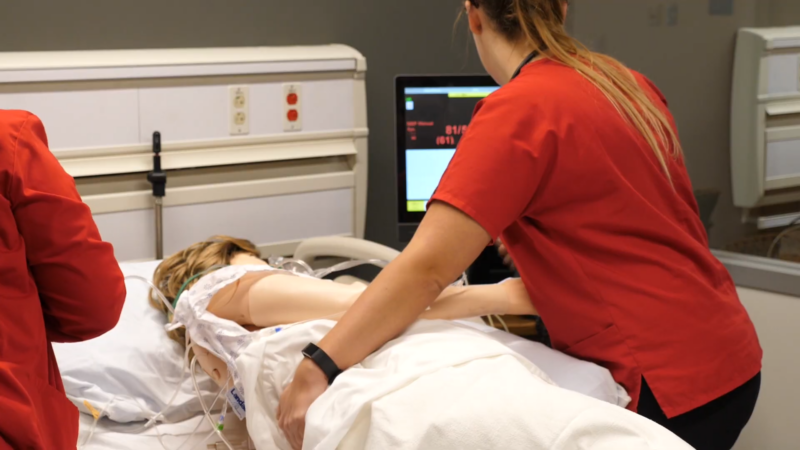Nursing is a dynamic field that constantly evolves, presenting new challenges and opportunities for growth. But how do you continue to advance in your nursing career when you feel like you’ve hit a plateau?
The good news is, that there are countless ways to enhance your practice, whether through refining your clinical skills, pursuing further education, developing essential soft skills, or exploring new roles.
1. Participate in Hands-On Workshops

Workshops offer an excellent opportunity to gain practical experience with new techniques and technologies. Unlike traditional lectures, these sessions emphasize active participation, allowing you to practice under the guidance of experienced professionals.
Look for workshops focusing on specialized skills, such as advanced wound care, phlebotomy, or the use of new diagnostic tools.
2. Pursue Certifications and Specializations
Specialized certifications not only enhance your skill set but also make you more marketable. Consider pursuing certifications in areas like critical care (CCRN), pediatric nursing (CPN), or geriatric nursing (GERO-BC). These credentials demonstrate your expertise in specific fields, often opening doors to specialized roles and higher pay.
Some in-demand certifications include:
Certification
Focus Area
Key Benefits
Wound Care Certification (CWCN)
Advanced wound management and care
Specialized knowledge in wound care, improved patient outcomes, career advancement in wound management
Oncology Certified Nurse (OCN)
Cancer care, treatment side effects, patient support
Expertise in oncology nursing, improved patient care in oncology, opportunities in specialized oncology roles
Certified Emergency Nurse (CEN)
High-pressure, emergency situations
Enhanced skills in emergency care, ability to handle critical situations, recognition as an expert in emergency nursing
3. Master Healthcare Technology

The integration of technology in healthcare is accelerating, with innovations like electronic health records (EHRs), telemedicine, and mobile health apps becoming standard. Proficiency in these tools can improve your efficiency and patient care quality.
Consider taking courses or attending seminars that focus on the latest healthcare technologies.
- Practice regularly: Familiarize yourself with EHR systems through tutorials or practice sessions.
- Stay updated: Follow tech trends in healthcare to stay ahead of the curve.
- Seek feedback: Work with colleagues to understand best practices and shortcuts.
4. Invest in Advanced Education
Advancing your education is a powerful way to deepen your knowledge, expand your skill set, and increase your career opportunities. The nursing field offers numerous educational pathways, each with its own set of benefits.
Advanced degrees, such as a Master’s of Science in Nursing (MSN) or a Doctor of Nursing Practice (DNP), can prepare you for leadership roles, advanced practice positions, or even teaching in nursing schools. If you’re considering taking the next step in your nursing career, visit this site to explore available online programs and find the right fit for you.
Benefits of an MSN
- Specialization: Focus on fields like family nurse practitioner, nurse educator, or nurse administration.
- Increased Salary: Advanced roles often come with a higher pay scale.
- Leadership Opportunities: Prepares you for roles such as Nurse Manager, Clinical Nurse Leader, or Director of Nursing.
Benefits of a DNP
- Clinical Leadership: Prepare for executive-level roles in clinical practice and policy-making.
- Advanced Clinical Skills: Deepen your clinical knowledge and research capabilities.
- Academic Opportunities: Qualifies you to teach at the university level or conduct high-level research.
Explore Online Learning Options

Accredited online programs can provide the same quality education as traditional on-campus options without the need to sacrifice your current job or personal life.
Pros of online learning:
- Flexibility: Study at your own pace and schedule.
- Accessibility: Learn from top institutions without geographic limitations.
- Cost-Effectiveness: Often more affordable than on-campus programs.
Utilize Professional Organizations
Professional organizations like the American Nurses Association (ANA), National League for Nursing (NLN), or specialty-specific groups provide resources such as continuing education courses, networking opportunities, and updates on the latest research.
Benefits of joining:
- Networking: Connect with peers and leaders in your specialty.
- Educational Resources: Access webinars, workshops, and conferences.
- Advocacy: Participate in shaping policies that affect nursing practice and healthcare.
5. Developing Soft Skills – The Human Side of Nursing

While clinical expertise is critical, the human element of nursing cannot be overlooked. Soft skills such as communication, empathy, and leadership are essential for delivering high-quality patient care and working effectively with colleagues.
Enhance Communication Skills
Effective communication is key to building trust and rapport with patients and their families. It’s not just about what you say but how you say it. Active listening, open body language, and clear, concise explanations are crucial.
Tips for improving communication:
- Practice active listening: Pay attention, ask questions, and avoid interrupting.
- Be mindful of non-verbal cues: Your body language and facial expressions can reinforce or contradict your words.
- Tailor your approach: Adjust your communication style based on the patient’s age, background, and emotional state.
“Be respectful of literacy, culture, opinions, fears, and how hard it can be to receive and digest bad news,” says Rosemary Dale – clinical professor of nursing and chair of the Department of Nursing at the University of Vermont.
Build Leadership and Teamwork Skills

Leadership isn’t reserved for those in managerial positions. Every nurse can benefit from developing leadership skills, such as problem-solving, decision-making, and conflict resolution. Good teamwork, on the other hand, ensures a harmonious and efficient work environment.
Ways to build leadership skills:
- Seek mentorship: Learn from those who excel in leadership roles.
- Volunteer for projects: Lead small projects or initiatives within your unit.
- Reflect on experiences: Analyze past situations where you took the lead and identify areas for improvement.
Cultivating Emotional Intelligence
Nursing is emotionally demanding. Emotional intelligence—the ability to recognize, understand, and manage your own emotions and those of others—can improve patient care, reduce stress, and enhance your professional relationships.
Regularly reflect on your emotions and triggers. Practice putting yourself in your patient’s or colleague’s shoes. Use techniques like mindfulness or deep breathing to handle difficult situations calmly.
6. Stay Current with Research and Trends

Healthcare is an ever-evolving field, with new research, treatments, and technologies emerging regularly. Staying current ensures you’re providing the best possible care and helps you remain competitive in your career.
Engage with Professional Journals and Publications
Reading professional journals like the American Journal of Nursing or Nursing Research keeps you informed about the latest studies, treatment protocols, and healthcare trends. Subscribe to both print and digital versions for easy access.
Attend Conferences and Seminars
Conferences provide opportunities to learn from industry leaders, participate in workshops, and network with peers. Look for events specific to your specialty or interest area. Many conferences also offer Continuing Education Units (CEUs), which are often required for license renewal.
Participate in Evidence-Based Practice (EBP)

Incorporating the latest research into your practice is crucial for delivering the best patient care. EBP integrates clinical expertise, patient preferences, and the most current research evidence. Joining or forming an EBP committee at your workplace can be a practical way to start.
The Bottom Line
Whether you’re refining your skills, seeking new knowledge, or exploring different roles, every step you take not only benefits your career but also enhances the care you provide. Growth doesn’t have to be overwhelming. Take it one step at a time, keep learning, and stay curious.
Related Posts:
- Top 5 Science-Backed Ways to Improve Your Mental Well-Being
- Why Should Heart Patients Be More Vigilant About…
- How to Prepare for a Career in Pharmacy - Future…
- Top 10 Online PhD in Nursing Programs: 2024 Reviews
- Breaking Down the Healthcare Education Bubble:…
- Unlock Your Potential: 6 Steps to Start Your Career…















